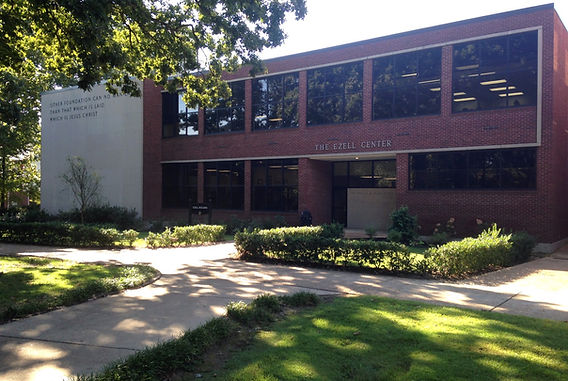Center for Cognitive Studies
HardingUniversity
Who We Are
The Center for Cognitive Studies is housed in the Department of Behavioral Sciences at Harding University and directed by Dr. Jeremiah Sullins. Research conducted in the Center for Cognitive Studies addresses questions regarding theoretical explanations of cognitive processes such as question generation, emotions, self-regulated learning, and knowledge acquisition. This lab focuses on applying research from computer science, education, and psychology into educational environments. The primary goals of the lab are to further our understanding of cognitive processes and to use this theoretical foundation to improve educational methods.
Current & Past Projects


Can a self-conscious emotion like shame be systematically induced and studied empirically? Gaining an understanding of when and where learners experience academic shame has far reaching implications throughout public education. By harnessing an understanding of academic shame, we begin to gain the ability to dampen the negative effects while simultaneously maximizing the lesser known advantages of this misunderstood self-conscious emotion.

Researchers are beginning to understand that emotions are not just motivational. It has now been suggested that emotions are inextricably linked to learning. However, not all emotions are detectable by behavioral manifestation (e.g., facial expressions). Because of this, the project sought to explore any linguistic differences that exist between confusion and frustration. We focused on these two emotions because research has suggested that both are prevalent in and important to learning.

Are “educational” shows providing training on the learning strategies that children need in order to become life-long learners? Of particular interest in the current study are the effects of question asking. The focus of this paper is to explore the research question: How often and to what extent is educational television teaching effective “question training” in children?

Can a self-conscious emotion like shame be systematically induced and studied empirically? Gaining an understanding of when and where learners experience academic shame has far reaching implications throughout public education. By harnessing an understanding of academic shame, we begin to gain the ability to dampen the negative effects while simultaneously maximizing the lesser known advantages of this misunderstood self-conscious emotion.
Click below for more info
Meet the Lab

Dr. Jeremiah Sullins
Lab Director
Dr. Jeremiah Sullins is an Associate Professor of Psychology in the Department of Behavioral Sciences at Harding University. As a cognitive psychologist his primary interests are in the learning sciences. His research focus is on learning/educational technologies, with branches extending into emotions, pedagogical strategies, tutorial dialogue/interaction, mechanisms of feedback, and question asking.

Trevor Durey
Trevor is a sophomore at Harding University pursing an undergraduate degree in Psychology with a minor in Criminal Justice. After graduation, he plans to pursue a Ph.D. in Clinical Psychology. Trevor joined Dr. Sullins’ lab in the Fall of 2019.
B.S Student

Katelyn Hawkins
Katelyn Hawkins is a sophomore at Harding University pursuing an undergraduate degree in Psychology. After graduation, she plans to pursue a Ph.D. in Clinical Psychology. Katelyn joined Dr. Sullins’ lab in the Fall of 2019.
B.S Student

Caralee Lynch
Caralee is a senior at Harding University and is pursuing an undergraduate degree in Psychology with a minor in Business Management. Upon graduation she plans to pursue a Ph.D. in Industrial Organizational Psychology. She is passionate about workplace reformation and inspiring industries to maximize their potential regarding employee management. Caralee joined Dr. Sullins' lab in the Fall of 2019.
B.S. Student

Anna Little
Anna Little is a junior at Harding University pursuing an undergraduate degree in Psychology. After graduation, she plans to pursue a Ph.D. in neuropsychology or clinical psychology. She is passionate about mental healthcare awareness and reform. Anna joined Dr. Sullins' lab in the Spring of 2019.
B.S. Student

Laura Waldron
Laura Waldron is a senior Cognitive Neuroscience major at Harding University. After graduation, she intends to pursue either a Ph.D. in Neuropsychology or Clinical psychology. One of her career goals is to work with the CDC (Center for Disease Control) in public health education awareness and development in underserved populations. Laura joined Dr. Sullins' lab in the Spring of 2019.
B.S. Student

Lucy Grace
Lucy Grace Camp is a senior at Harding University pursuing an undergraduate degree in Cognitive Neuroscience. After graduation, she plans to pursue a Ph.D. in Neuropsychology. She is passionate about the neuroscience of learning and its applications in the education system. Lucy Grace joined Dr. Sullins' lab in the Fall of 2018.
B.S. Student

Ashlyn Wilson
Ashlyn Wilson is a senior at Harding University pursuing a degree in Psychology with a minor in Sociology. After graduating from Harding, she plans to pursue a Ph.D. in Clinical Psychology. She joined Dr. Sullins’ lab in the Spring of 2018.
B.S. Student
Get in Touch
Tel: 501-279-5531
Fax: 501-279-4319
915 E. Market Ave. Searcy, AR 72149 Box 12260
How to Join
If you are an undergraduate student in psychology and are interested in volunteering, please email your CV and cover letter to Dr. Jeremiah Sullins. By volunteering at the Center for Cognitive Studies, you will have the opportunity to develop valuable research skills necessary for entry in graduate school. More specifically, you will have the opportunity to work with artificially-intelligent educational software, run participants, and work with a variety of data.








PARTICIPANT SIGN UP
Are you a Harding University student looking to participate? Click on the button!
Any questions about signing up? Email: hucognitivestudies@gmail.com












